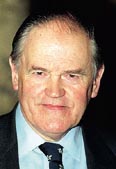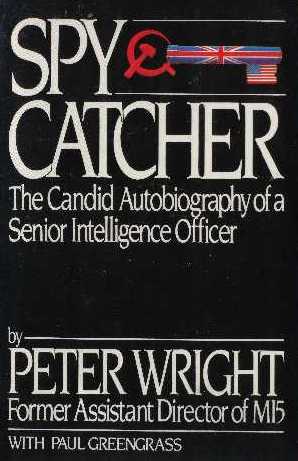Difference between revisions of "Robert Armstrong"
(→Spycatcher) |
(→Spycatcher) |
||
| Line 8: | Line 8: | ||
==Spycatcher== | ==Spycatcher== | ||
[[Image:Spycatcher.jpg|thumb|right]] | [[Image:Spycatcher.jpg|thumb|right]] | ||
| − | Armstrong, as the new secretary to UK prime minister Margaret Thatcher's Cabinet, "effortlessly took on the role as her most senior closest official adviser"<ref>"[http://www.civilservice.gov.uk/about/do/evolution/5.asp The evolution of the United Kingdom Civil Service 1848-1997]", Civil Service website, February 2007, accessed January 2009</ref>. This was despite that fact that: | + | According to the Civil Service website, Armstrong, as the new secretary to UK prime minister Margaret Thatcher's Cabinet, "effortlessly took on the role as her most senior closest official adviser"<ref>"[http://www.civilservice.gov.uk/about/do/evolution/5.asp The evolution of the United Kingdom Civil Service 1848-1997]", Civil Service website, February 2007, accessed January 2009</ref>. This was despite that fact that: |
:The arrival of Margaret Thatcher’s government in the corridors of Whitehall in May 1979 was the biggest jolt that the Civil Service had experienced in living memory. For a while the whole Whitehall system almost visibly juddered... It was a culture shock. The elite administrative grade of the Civil Service in Whitehall has come to think of itself as the guardian and trustee of national continuity...The Prime Minister and a small group of sympathetic ministers...were arguing that its ideas and advice had proved bankrupt, that now was the time for an entirely new approach.<ref>"[http://www.civilservice.gov.uk/about/do/evolution/5.asp The evolution of the United Kingdom Civil Service 1848-1997]", Civil Service website, February 2007, accessed January 2009</ref> | :The arrival of Margaret Thatcher’s government in the corridors of Whitehall in May 1979 was the biggest jolt that the Civil Service had experienced in living memory. For a while the whole Whitehall system almost visibly juddered... It was a culture shock. The elite administrative grade of the Civil Service in Whitehall has come to think of itself as the guardian and trustee of national continuity...The Prime Minister and a small group of sympathetic ministers...were arguing that its ideas and advice had proved bankrupt, that now was the time for an entirely new approach.<ref>"[http://www.civilservice.gov.uk/about/do/evolution/5.asp The evolution of the United Kingdom Civil Service 1848-1997]", Civil Service website, February 2007, accessed January 2009</ref> | ||
Revision as of 19:27, 12 January 2009
Lord Robert Temple Armstrong, Baron Armstrong of Ilminster, was educated at Eton College and Christ Church College, Oxford University. He was with the Treasury between 1950 and 1964, and Reginald Maudling's principal private secretary (PPS). He held the office of assistant secretary of the cabinet office between 1964 and 1966, the office of assistant secretary of Treasury between 1967 and 1968, when he was Roy Jenkins' PPS, joint PPS to the Chancellor of the Exchequer in 1968, under-secretary of the Treasury between 1968 and 1970, PPS to the prime minister between 1970 and 1975, deputy undersecretary to the Home Office between 1975 and 1977, and private undersecretary to the Home Office between 1977 and 1979.
He was invested as a Knight Commander, Order of the Bath (K.C.B.) in 1978 and held the office of Secretary to the Cabinet between 1979 and 1987. He was invested as a Knight Grand Cross, Order of the Bath (G.C.B.) in 1983.
He was a director of N M Rothschild & Sons in 1988, a director of Shell Transport and Trading in 1988, a director of BAT Industries between 1988 and 1997 and was created a Baron in 1988. He was a director of the Bank of Ireland in 1991 and a director of Carlton TV between 1991 and 1995, Bristol & West Building Society 1988-, Inchcape 1988-, Lucas Industries 1989-92, RTZ Corporation 1988-, Chairman Biotechnical Investments Ltd since 1989, and member of Robeco Group 1988-. He held the office of Chancellor of Hull University in 1994.[1]
Spycatcher
According to the Civil Service website, Armstrong, as the new secretary to UK prime minister Margaret Thatcher's Cabinet, "effortlessly took on the role as her most senior closest official adviser"[2]. This was despite that fact that:
- The arrival of Margaret Thatcher’s government in the corridors of Whitehall in May 1979 was the biggest jolt that the Civil Service had experienced in living memory. For a while the whole Whitehall system almost visibly juddered... It was a culture shock. The elite administrative grade of the Civil Service in Whitehall has come to think of itself as the guardian and trustee of national continuity...The Prime Minister and a small group of sympathetic ministers...were arguing that its ideas and advice had proved bankrupt, that now was the time for an entirely new approach.[3]
In 1986 Armstrong famously snuffed out the public interest defence[4] for civil servants following the case of Clive Ponting, the civil servant who blew the whistle on the sinking of the Belgrano, the Westland debates of early 1986, and the resignation of Michael Heseltine and other matters. He produced a memorandum on the duties and responsibilities of civil servants to Ministers on 25 February 1985 setting out that Servants of the crown meant servants of the government of the day, Armstrong ruled that:
- Civil servants are servants of the Crown. For all practical purposes the Crown in this context means and is represented by the Government of the day...the Civil Service as such has no constitutional personality or responsibility separate from the duly elected Government of the day.[5]
Armstrong, who retired as head of the Civil Service in late 1987, is also credited with coining a memorable phrase (others credit Edmund Burke[6]) in 1986 when cross-examined in the supreme court in New South Wales during the Australian 'Spycatcher' trial:
- Lawyer: What is the difference between a misleading impression and a lie?
- Armstrong: A lie is a straight untruth.
- Lawyer: What is a misleading impression - a sort of bent untruth?
- Armstrong: As one person said, it is perhaps being "economical with the truth".[7]
Declassified files[8] state that Armstrong, while principal private secretary to Prime Minister Edward Heath, wrote to the Attorney General's office in September 1973 in an attempt to invoke a little-used criminal libel proceedings to prosecute Peter Hain, then, as opposed to now, a thorn in the government's side over his activities with the anti-aparteid movement. Hain had been a target of BOSS, the South African Secret Intelligence Service, since 1968 and they planned to set him up and discredit his activities, which they did.[9]According to BOSS's Gordon Winter these activities included aid from the Society for Individual Freedom, which he describes as a British Intelligence front involving George K. Young, Ross McWhirter (both with UK intelligence connections) and Gerald Howarth.[10]This is taken up by Hain himself in his account of being framed for bank robbery.[11] The Armstrong letter may well be connected to this given his membership of the Institute for the Study of Conflict.
Anglo-Irish negotiations
- The first tentative contacts between the British and the Irish took place in 1982. David Goodall, a senior British diplomat attached to the Cabinet Office, from a Catholic family with connections to Ireland, began talking to Michael Lillis, a senior Irish diplomat, ferociously clever and with staunch republican antecedents. The NIO disapproved of the whole exercise and, as a result, was largely kept out of the loop. The negotiations were conducted in great secrecy with Goodall joined by the Cabinet Secretary Robert Armstrong on the British side and Lillis joined by another senior Irish diplomat, Sean Donlon, along with Dermot Nally, the Irish Cabinet Secretary.[12]
References
- ↑ All biographical information is from "Person page 4448", ThePeerage.com website, accessed January 2009
- ↑ "The evolution of the United Kingdom Civil Service 1848-1997", Civil Service website, February 2007, accessed January 2009
- ↑ "The evolution of the United Kingdom Civil Service 1848-1997", Civil Service website, February 2007, accessed January 2009
- ↑ The claim that breach of the UK's Official Secrets Act should not be prosecuted if the information disclosed is in the public interest. For more information on this defence, see "Public Interest Defence", Hansard, HC Deb 22 February 1989 vol 147 cc1036-50, accessed January 2009.
- ↑ "The evolution of the United Kingdom Civil Service 1848-1997", Civil Service website, February 2007, accessed January 2009
- ↑ "Economical with the truth", Phrase Finder website, accessed January 2009
- ↑ "Economical with the truth", Phrase Finder website, accessed January 2009
- ↑ BBC (2004) Hain libel threat shown in papers
- ↑ Gordon Winter (1981) Inside Boss, Penguin, p370
- ↑ Gordon Winter (1981) Inside Boss, Penguin, p382-383
- ↑ Peter Hain (1987) A Putney Plot, p146-147, Spokesman.
- ↑ Great Hatred, Little Room, Making Peace in Northern Ireland by Jonathan Powell,The Bodley Head, 2008, p59.

